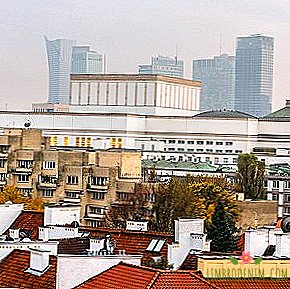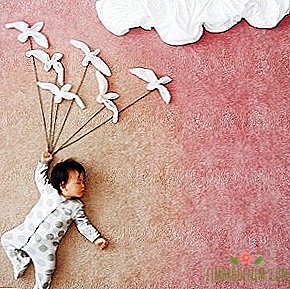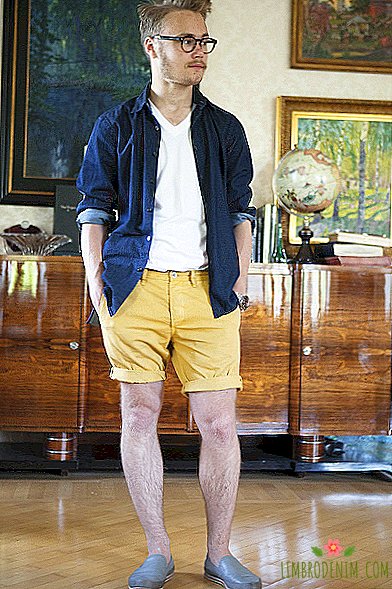"Unreal" Europe: How I went to study in Warsaw
Boredom is one of the main driving forces of this world. It seems that it was from her that my story with Poland began: at the beginning of the eleventh class I decided that I was bored, it was time to change something and arrange a test for myself. For example, to learn from scratch to live in another country and in another language. The only thing that tied me to the place and did not allow me to break right now was the hotly disliked lyceum - so it seemed to me the most logical decision to go abroad for higher education immediately after graduation.
A little surfing on the Internet - and here it is, the university of my dreams and, it seems, the best specialty in the world. Humanitarian, modern and about everything - what could be better when you are seventeen and you still do not quite understand what you want from this life? Polish "kulturoznawstwo" could be translated as "cultural studies", but this is not entirely true. I did not study classical art, instead I explored the strange modern and scientifically viewed American TV shows of a new generation and computer games. I also shot short films, organized events and followed people - for educational purposes, of course.

Training
I fell in love with the university I found in absentia and decided what I wanted to go there. Love for Kieslowski is a reason to leave for Poland, but there are also enough objective reasons. There is a good education, a pleasant (not to be confused with Western European) standard of living and completely student prices for everything. My plan was very simple: learn the language, enroll, leave. It is terrible to say, but before I took up the Polish, it seemed to me terribly ugly - what could be beautiful in endless sizzling? But the rational part of consciousness reminded that this is a simple language for Russian speakers, and what else could be the requirements of someone who wants to reach level B2 in one academic year? An ambitious undertaking to learn Polish on my own rather quickly broke into the realization that I did not hear my mistakes, and fixing them was not the best idea. There were no courses in my town, but there was one tutor - I decided to go to him once a week.
A good level of language is not so much a necessity (at the household level, most likely, there will be enough basic knowledge) as a tribute to the country to which you are going to go for a long time. Since classes once a week are not serious, I decided to immerse myself in the language environment as much as possible. As soon as I figured out how to read, I immediately took up Polish books. At first, one page of The Witcher took fifteen minutes of torment with a dictionary, but the process was worth it. I read wherever I could, for example, at the last desks in the lyceum, scoring lessons on history and the school curriculum. Audiobooks helped (you get used to the mad tempo of the language at the same time) and, of course, films - at first with subtitles.
Finally, breaking free from the shackles of Russian education, in the summer of 2013 I received a diploma and made an apostille - it confirms the authenticity of the education certificate, and this is necessary for the nostrification of the diploma to which the student is given the first six months after admission. It is not at all difficult to enter a humanitarian university in Poland: it is enough to come and submit documents.
I applied for a university application from a smartphone - then it still seemed like something from the future - and received a list of necessary documents. The requirements for the standard package were reduced to “translate into Polish”, and the application for admission and other documents of the university itself could only be printed. I enrolled in the last year when I did not need to confirm my knowledge of the language with a state exam certificate. The requirement, by the way, is quite reasonable: for some reason, the majority of Russian-speaking students who come to study in Poland, the level of uncertain dancing at the level of A2. I arrived in Warsaw, filed documents, received confirmation of enrollment, and only then I learned that there is a certain quota for the number of seats, and my course was particularly crowded.
Study
Education in Poland for foreigners is mostly paid, but quite affordable - for example, my university, which bears the proud title of the best private university in the country (and the first in Eastern Europe), will cost twice as cheap as Moscow universities. Some state universities have small quotas for foreigners and grants, but this still applies to classical education. My goal was to escape from this.
Plus, a private institution of higher education is that you are treated as a client: your opinion about each subject is taken into account (there are anonymous online questionnaires at the end of each semester, they are filled voluntarily and have real power), you can control the educational process and get the most recent knowledge - go to "animal studies" (a branch of posthumanism, in which animals are treated as equal to humans) for example. Of the minuses - accommodation and insurance will have to take over.
The school year begins in October and ends at the end of June, and learning five or six days a week is nonsense: it is believed that a student should have at least one day a week for self-education. At the same time, in my university, lectures rarely started before ten (and those that started at half past eight, we called minus first), and usually ended in the late afternoon. Correspondence students study on weekends - as a rule, they have one weekend of intensive study every two weeks. The atmosphere in the university reigns relaxed - for example, the teacher may well tell a lecture, sitting on the table, dangling his legs and occasionally swearing, or generally sit down with the students on the nearest windowsill.
Subjects are collected in thematic modules. In the "record book" (which, by the way, is in fact not present - grades are set online) there is only an estimate for the module - the arithmetic average of the marks for all subjects. I almost did not have tests and exams: the subject is usually closed by a project - it could be a study, a presentation, an essay, a practical project, a concept of a work of art, a film, an organized event. In general, anything, and only occasionally - brewing questions.
To get a diploma, you need to write a job - you have been doing this all last year with your supervisor. The topic can be almost any, the main thing - unique and with space for your own conclusions, theories and arguments. My, for example, sounds like "Estetization of violence in the TV series" Hannibal "" - it's great when you watch a TV series in the summer, think about what a great scientific potential it has, and write a job, exactly what you thought.
I find it hard to imagine a more comfortable environment for student life than the Polish. A student (he is "legitymacja") gives you discounts for almost everything (including the railway, so that the host country can be explored endlessly) or free admission to museums. Accommodation, food and entertainment with Polish prices and so affordable. You learn, and at the same time you have a lot of time for your own business (at least three full days for hobbies and work) and great opportunities to travel around the country and the rest of Europe. After all, among other things, Poland is a paradise for lovers of low-cost airlines and almost free bus tickets.

Warsaw
Going to Warsaw, I had absolutely no idea about her, I was never in it. Not expecting anything, I found everything. Warsaw turned out to be an ideal city for life, which eventually even became a “home” in my coordinate system. In fairness, the Poles themselves consider Warsaw ugly: it, destroyed during the Warsaw Uprising and rebuilt from the ashes, is very different from other Polish cities. It does not have the unnatural "postcard" beauty of Krakow, a typical European city - but it won me over with its diversity.
In Warsaw, it is very easy to find exactly what you want. As a corner of the “beautiful Europe”, the Old Town, rebuilt according to the preserved photographs and drawings, serves otherwise as a vibrant and dynamic city. Each area has its own character. Here you will find a skyscraper center, a cozy district with fashionable establishments and convenient traffic intersection, and an artistic shabby piece of the city, where half the population is artists, and the second half are homeless, and a wild riverbank with a beach on the other side of the center. Enough and European charm, and completely Eastern in spirit sleeping areas. My most native place is Muranov, the territory of the former Jewish ghetto, where socialist architecture now reigns. Every time some work is carried out there, they dig up what is left of life in the ghetto: dishes, toys, fragments of houses — but at the same time this is a trendy location just between the center and the Old Town. It is for such crazy contrasts that I seem to love Warsaw.
No one anywhere treated me better than the Poles in Poland: you are surrounded by that very Polish politeness and I spent all my Warsaw time in an atmosphere of understanding and friendliness. Nobody breaks your personal space (unless you are pulled to watch the contents of your ipod, having drunk a lot), once again you will not touch the shoulder, ask about your life and impose communication. If there is a crowd around and someone realizes that he is hurt by passing by, he will apologize beforehand. In general, "przepraszam", that is, "I beg your pardon," is one of those words, most of which only says "hello." And also Poland is when you sneeze, and you scream "be healthy" on the other side of the street.
It is worth noting that I do not idealize the country, but I just love it very much: if you move somewhere at seventeen, it will not work otherwise. When deciding to change the place of residence at that age, it is worth remembering that this is where you will learn independence - from basic trips to the bank to the subtleties of communication and vision of the world. It is these standards that will be perceived by you as the only true ones - calling Warsaw their home, I mean it, even if my interlocutors sometimes grin with disbelief.
Contrasts
Poland is a cozy and very contrasting country, stuck somewhere between Slavic culture and "real" Europe. This is evident in the mentality of people, and in politics, and just in an urban environment. Poland, of course, has a lot of problems - after all, it is one of the poor countries of the European Union, and the current government makes people protest against such absurd bills, which are hard to believe: for example, a couple of months ago, none of my friends imagined could that the independence of the courts from the state will have to defend their own. Fortunately, democracy and protests are working in the country. At the same time, abortions, serious unemployment are prohibited in Poland, and the country is very religious. Against this background culture flourishes and continually modern institutions of the European level appear.
There is a similar story with people - all Poles can be divided into two types: there are advanced and immaculately polite Europeans, and there are not especially interested in the outside world, nationalistic Poles, advocating Poland with independent values from the European Union. From the contrasting annual events - the May march for the legalization of marijuana and the autumn nationalist procession, because of which on the eleventh of November (on Independence Day of Poland) the entire conscious part of Facebook suffers. At the first gather European guests who believe in the power of cannabis, on the second - neo-Nazis from all over Europe.
In Warsaw, low-noise low-end trams cut through, and the city itself is full of bicycle lanes and oriental tasteless advertisements, which sometimes close entire facades of buildings (local activists, however, continually try to do something with this chic of the era of consumption). The state-of-the-art museum of the history of Polish Jews is adjacent to inconspicuous block houses from the seventies, and on one of my favorite squares are beautiful European houses and all the same unsightly blocks, and skyscrapers and Stalinist skyscrapers jut out nearby. This view for me is an illustration not only of my beloved city, but also of the whole of Poland.
All this causes not only a minute stupor, but also a desire to embrace the whole country. A good half of my conversations are still about Warsaw, and I know for sure that I will be back sooner or later, one way or another.
Photo:Sergii Figurnyi - stock.adobe.com, Stefan Wolny - stock.adobe.com, Alexandra Lande - stock.adobe.com





